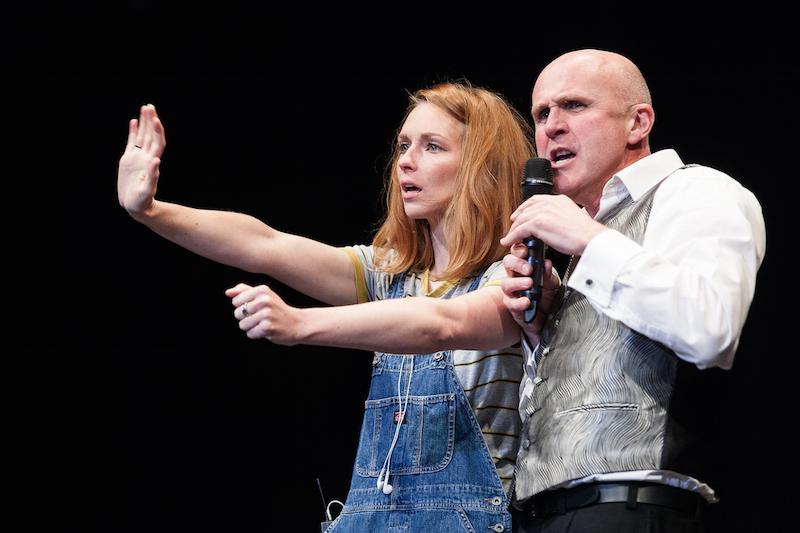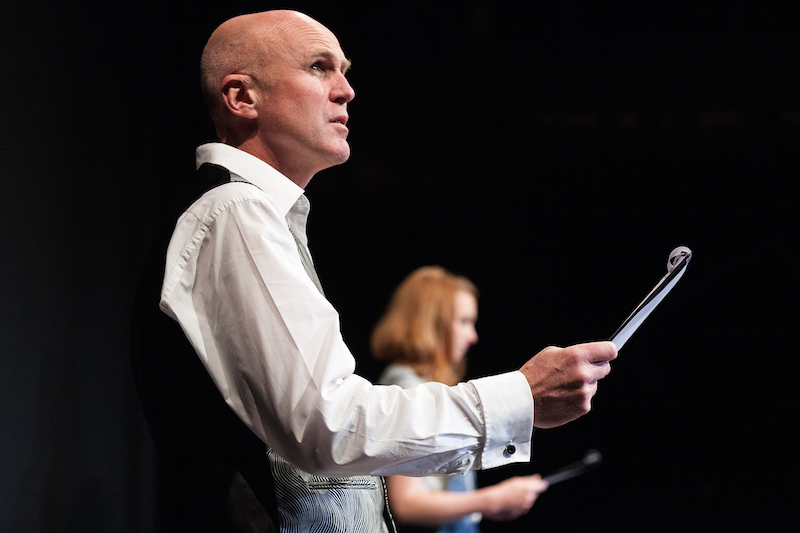An Oak Tree, National Theatre | reviews, news & interviews
An Oak Tree, National Theatre
An Oak Tree, National Theatre
Tim Crouch's experimental meditation on performance is indelibly powerful

The play I have just seen is not the play you will see. Of course, one of the draws of live performance is that no two nights are the same, but that idea is taken to a mesmerising extreme in Tim Crouch’s An Oak Tree, celebrating its 10th anniversary. Every night, a new guest actor – who has never seen the show nor read the script – joins Crouch in this two-hander; past playmates include Sophie Okonedo, Christopher Eccleston, Frances McDormand and Roger Lloyd Pack.
Yet this is no mere intellectual exercise. Crouch’s bold formal experimentation is in service of an empathetic tale suffused with grief. A stage hypnotist (Crouch, pictured below by Greg Veit) accidentally killed a young girl while driving; three months later, it still haunts him. Joining him in emotional limbo is her father, Andy (Conor Lovett last night), who can’t accept his daughter Claire is really gone. Instead, he regularly visits the eponymous oak tree by the side of the road where she died, convinced she has taken new form.
 The title nods to a 1973 Michael Craig-Martin conceptual artwork that depicts a glass of water, but is called An Oak Tree. That relationship between reality and perception pervades Crouch’s piece, from the illusions of hypnosis to grieving Andy’s abstract interpretation of Claire’s fate – heartbreakingly conflicting with his wife Dawn clinging to “material evidence” – and our acceptance of the metamorphosis of actor into character, a process that perversely seems all the more magical when its workings are laid bare.
The title nods to a 1973 Michael Craig-Martin conceptual artwork that depicts a glass of water, but is called An Oak Tree. That relationship between reality and perception pervades Crouch’s piece, from the illusions of hypnosis to grieving Andy’s abstract interpretation of Claire’s fate – heartbreakingly conflicting with his wife Dawn clinging to “material evidence” – and our acceptance of the metamorphosis of actor into character, a process that perversely seems all the more magical when its workings are laid bare.
The bereaved father could be angry or anguished; in Lovett’s hands, he’s utterly drained. His “I wish I were dead” is a chilling statement of fact, and he accepts Crouch’s condolences with an almost dreamlike, “It isn’t really me. And anyway, it hasn’t happened yet.” Is that Lovett speaking or Andy? Meta commentary, or denial and complete loss of self? The blurring of identities underscores the bewilderment of grief, thrust into a situation in which you have no idea how to act.
Lovett’s understatement is an effective contrast to Crouch’s manic energy, as both the failed pub performer, stumbling over cheesy patter and channelling guilt through sadistic manipulation, and despairing wife: while Dawn weeps, Andy uses hypnosis as escapist therapy, widening the gulf between them. Lovett also provides welcome moments of release, delivering lines like “It’s very well written” with wry irony.
Crouch, co-directing with Karl James and Andy Smith, finds a delicate balance between highlighting the artificiality of performance and transcending it. There’s a jokey reference to surviving daughter Marcia only appearing as a chair, but when Dawn confronts Andy by the roadside, the chair Crouch carries is very much a vulnerable child who’s losing her father. It’s an indelible reminder of the power of theatrical suggestion.
rating
Explore topics
Share this article
The future of Arts Journalism
You can stop theartsdesk.com closing!
We urgently need financing to survive. Our fundraising drive has thus far raised £49,000 but we need to reach £100,000 or we will be forced to close. Please contribute here: https://gofund.me/c3f6033d
And if you can forward this information to anyone who might assist, we’d be grateful.

Subscribe to theartsdesk.com
Thank you for continuing to read our work on theartsdesk.com. For unlimited access to every article in its entirety, including our archive of more than 15,000 pieces, we're asking for £5 per month or £40 per year. We feel it's a very good deal, and hope you do too.
To take a subscription now simply click here.
And if you're looking for that extra gift for a friend or family member, why not treat them to a theartsdesk.com gift subscription?
more Theatre
 Othello, Theatre Royal, Haymarket review - a surprising mix of stateliness and ironic humour
David Harewood and Toby Jones at odds
Othello, Theatre Royal, Haymarket review - a surprising mix of stateliness and ironic humour
David Harewood and Toby Jones at odds
 Macbeth, RSC, Stratford review - Glaswegian gangs and ghoulies prove gripping
Sam Heughan's Macbeth cannot quite find a home in a mobster pub
Macbeth, RSC, Stratford review - Glaswegian gangs and ghoulies prove gripping
Sam Heughan's Macbeth cannot quite find a home in a mobster pub
 The Line of Beauty, Almeida Theatre review - the 80s revisited in theatrically ravishing form
Alan Hollinghurst novel is cunningly filleted, very finely acted
The Line of Beauty, Almeida Theatre review - the 80s revisited in theatrically ravishing form
Alan Hollinghurst novel is cunningly filleted, very finely acted
 Wendy & Peter Pan, Barbican Theatre review - mixed bag of panto and comic play, turned up to 11
The RSC adaptation is aimed at children, though all will thrill to its spectacle
Wendy & Peter Pan, Barbican Theatre review - mixed bag of panto and comic play, turned up to 11
The RSC adaptation is aimed at children, though all will thrill to its spectacle
 Hedda, Orange Tree Theatre review - a monument reimagined, perhaps even improved
Scandinavian masterpiece transplanted into a London reeling from the ravages of war
Hedda, Orange Tree Theatre review - a monument reimagined, perhaps even improved
Scandinavian masterpiece transplanted into a London reeling from the ravages of war
 The Assembled Parties, Hampstead review - a rarity, a well-made play delivered straight
Witty but poignant tribute to the strength of family ties as all around disintegrates
The Assembled Parties, Hampstead review - a rarity, a well-made play delivered straight
Witty but poignant tribute to the strength of family ties as all around disintegrates
 Mary Page Marlowe, Old Vic review - a starry portrait of a splintered life
Tracy Letts's Off Broadway play makes a shimmeringly powerful London debut
Mary Page Marlowe, Old Vic review - a starry portrait of a splintered life
Tracy Letts's Off Broadway play makes a shimmeringly powerful London debut
 Little Brother, Soho Theatre review - light, bright but emotionally true
This Verity Bargate Award-winning dramedy is entertaining as well as thought provoking
Little Brother, Soho Theatre review - light, bright but emotionally true
This Verity Bargate Award-winning dramedy is entertaining as well as thought provoking
 The Unbelievers, Royal Court Theatre - grimly compelling, powerfully performed
Nick Payne's new play is amongst his best
The Unbelievers, Royal Court Theatre - grimly compelling, powerfully performed
Nick Payne's new play is amongst his best
 The Maids, Donmar Warehouse review - vibrant cast lost in a spectacular-looking fever dream
Kip Williams revises Genet, with little gained in the update except eye-popping visuals
The Maids, Donmar Warehouse review - vibrant cast lost in a spectacular-looking fever dream
Kip Williams revises Genet, with little gained in the update except eye-popping visuals
 Ragdoll, Jermyn Street Theatre review - compelling and emotionally truthful
Katherine Moar returns with a Patty Hearst-inspired follow up to her debut hit 'Farm Hall'
Ragdoll, Jermyn Street Theatre review - compelling and emotionally truthful
Katherine Moar returns with a Patty Hearst-inspired follow up to her debut hit 'Farm Hall'
 Troilus and Cressida, Globe Theatre review - a 'problem play' with added problems
Raucous and carnivalesque, but also ugly and incomprehensible
Troilus and Cressida, Globe Theatre review - a 'problem play' with added problems
Raucous and carnivalesque, but also ugly and incomprehensible

Add comment